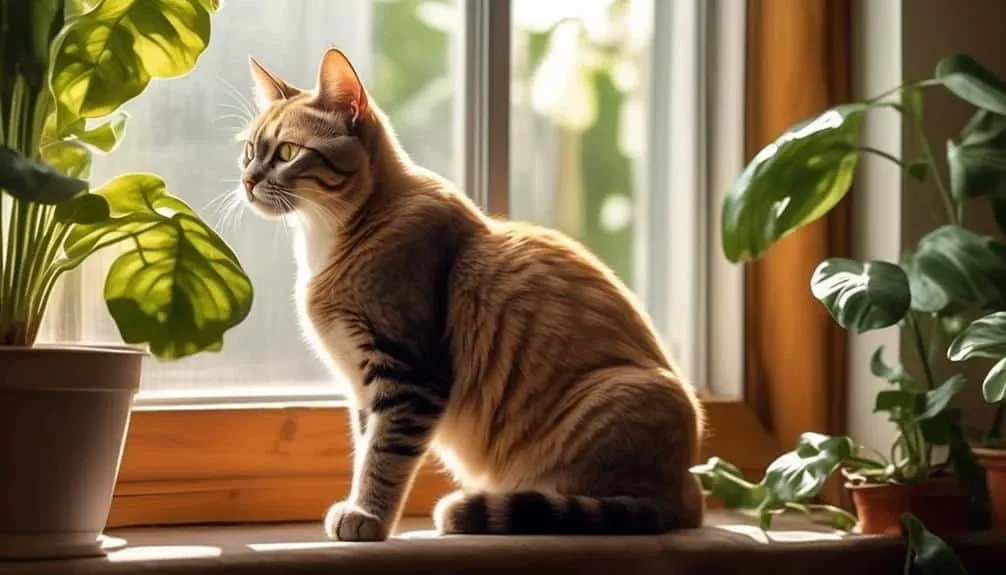The Best Fluffy Pancakes recipe you will fall in love with. Full of tips and tricks to help you make the best pancakes.

Have you ever found yourself sitting on the couch, enjoying a quiet evening, when suddenly your cat jumps up and starts nibbling on your arm? It's certainly a surprising behavior, but there's more to it than meets the eye. In fact, cat nibbling can be a fascinating insight into their world and the way they communicate with us.
So, why do cats nibble? What drives them to engage in this seemingly odd behavior? Prepare to be intrigued as we uncover the surprising reasons behind cat nibbling and explore the intricate ways our feline friends express themselves.
Key Takeaways
- Cats nibble as a way to show affection, bond with humans, and groom themselves and their babies.
- Nibbling can also be a sign of teething in kittens and a way for cats to relieve stress.
- Nibbling can indicate a cat's desire for personal space or their need for attention.
- Redirecting the cat's nibbling behavior to toys and praising their playfulness can be effective in managing this behavior.
Affectionate Nibbling
Affectionate nibbling is a common behavior exhibited by cats as a way to show their fondness for humans. Cats use their mouths to gently nibble on their owners as a form of communication and bonding. Understanding the role of body language is essential in interpreting this behavior.
Pay attention to the cat's overall demeanor, such as relaxed body posture and purring, which indicate a positive and affectionate intent. However, it's important to redirect this behavior if it becomes uncomfortable or painful.
To redirect affectionate nibbling, provide appropriate toys or objects for the cat to chew on, such as catnip-infused toys or dental treats. Additionally, reinforcing positive behavior with treats and praise can help the cat associate alternative actions with rewards.
It's crucial to remember that cats nibble out of love and affection, and redirecting their behavior will ensure a harmonious relationship between you and your feline companion.
Teething
As we move from discussing the behavior of affectionate nibbling, let's now explore the fascinating topic of teething in cats.
Teething is a natural process that kittens go through as they grow. It's a crucial stage in their development, but it can also be uncomfortable and painful for them. During teething, kittens experience pain and discomfort as their baby teeth fall out and their adult teeth start to come in.
To cope with this pain, kittens often nibble on objects, including their owners. Providing teething toys for kittens can help alleviate their discomfort by providing them something safe to chew on. These toys are designed to be soothing for their gums and can redirect their attention away from nibbling on inappropriate objects, such as furniture or hands.
Stress Relief
Stress relief is a common reason why cats engage in nibbling behaviors. When cats experience stress, they may resort to nibbling as a way to cope. This behavior can range from soft nibbles to more aggressive ones, depending on the level of stress.
Stress in cats can be caused by various factors, such as changes in their environment or health conditions. Nibbling helps cats release tension and provides a sense of comfort. If you find your cat nibbling on you as a stress-relief behavior, it's important to understand that this is a natural response.
However, it's also essential to redirect this behavior through necessary training. Providing your cat with appropriate toys and play activities can help redirect their stress-relief nibbling behavior, ensuring their well-being and preventing any potential harm.
Request for Space
When a cat engages in nibbling behavior, it can also be a clear communication of their need for personal space. Nibbling is a polite way for cats to express their desire to be left alone. Ignoring this request may lead to more forceful biting, which can cause skin damage. To ensure a harmonious relationship with your cat, it's important to respect their wishes for personal space.
Here are three ways to deal with forceful biting and set boundaries and consequences:
- Recognize the signs: Pay attention to your cat's body language and behavior. If they start nibbling and showing signs of discomfort, it's a clear indication that they want some space.
- Give them space: When your cat requests personal space through nibbling, it's essential to back off and give them the distance they need. This will help prevent any escalation of the behavior.
- Set boundaries and consequences: If your cat continues to engage in forceful biting despite giving them space, it's important to establish boundaries. This can include redirecting their attention to toys or implementing consequences such as withdrawing attention or ending playtime.
Attention Seeking
When your cat's nibbling behavior shifts towards seeking attention, it's important to understand the underlying reasons and how to appropriately respond.
Cats may nibble on your arms, hands, legs, or feet as a way to seek extra attention from you. This attention-seeking behavior can be accompanied by other behaviors like swatting or meowing.
To manage attention seeking, it's crucial to spend quality time with your cat, providing them with the attention they crave. Engage in petting and interactive play sessions to fulfill their need for attention.
Additionally, you can redirect their nibbling behavior to toys or play activities, providing them with an alternative way to seek attention.
Conclusion
In conclusion, cat nibbling is a multifaceted behavior with surprising reasons behind it. Whether it's affectionate nibbling, teething relief, stress relief, a request for space, or attention seeking, cats have unique ways of communicating with us.
By understanding the motivations behind cat nibbling, we can develop a deeper bond with our feline friends and ensure their needs are met. So, next time your cat nibbles on you, remember that it's their way of expressing themselves and seeking connection.








